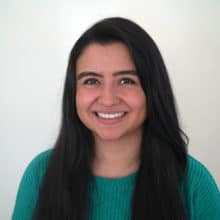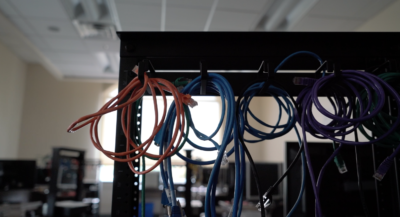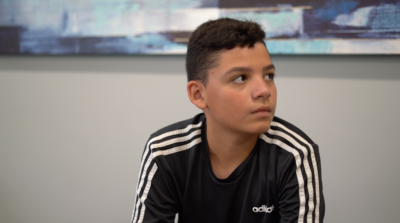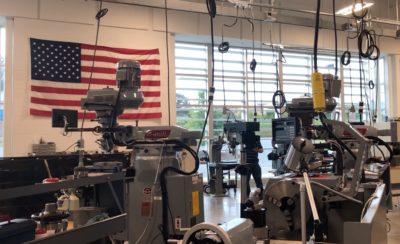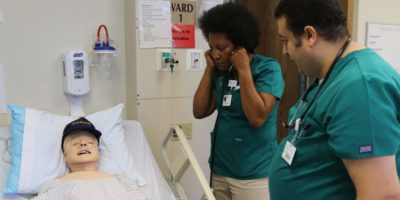This article is part of the Solution Seekers series. Find the full series here.
Daejah Ramseur recalls the first time she learned about Year Up Charlotte. Central Piedmont Community College (CPCC) sent an email to all their students introducing this workforce development program to them.
Fast forward a year later, and after learning more about the program, Ramseur decided to apply. “I had just given birth and after maternity leave, I was trying to figure out what I wanted to do next,” she said. “I knew I didn’t want to work a dead-end job, and I knew I didn’t want to invest years into education before I could get a decent paying job to support my family.” Ramseur is now part of Year Up Charlotte’s newest cohort and is currently interning at Merck.
Year Up Charlotte launched in August 2019, four years after Raj Chetty’s research ranked Charlotte dead last for social mobility among the 50 largest metro areas in the country. Erika Potts, Associate Director of Programs at Year Up Charlotte, explained the motivation for launching: “We wanted to connect those young adults who could not find full-time employment. We wanted to train them and get them access to those opportunities.”
Year Up’s goals are twofold: to connect talented, motivated young adults with meaningful gainful employment and to introduce them or reintroduce them into the educational setting. Potts explained that the team approaches every single student with the understanding that they already have what it takes to be successful in corporate America. “It’s our role to really just connect them with those opportunities so that they can soar and be successful,” she said.
Year Up Charlotte is one of 26 Year Up sites across the United States and the first one in North Carolina. Year Up began in 2000 with the purpose of providing young adults the skills, experiences, and support needed to empower them so they can reach their potential through corporate careers and higher education. Originally, they worked with adults ages 18 to 24, but since the pandemic, they have increased the age range to 26 years old.
The national board governs the organization as a whole. Locally, every campus counts on a site director who manages the day-to-day operations.
Year Up Charlotte is funded through two avenues. One is through their corporate partnerships, which cover the costs of training and education for the students to become interns. The program also receives philanthropic support.
The model
Year Up Charlotte is a one-year program that is split into two phases. In the first six months, called Learning and Development, students take classes at Central Piedmont Community College. “That’s where they’re learning the core and technical skills that they’re going to need to apply during the internship phase,” Potts explained.
Year Up complements these college classes with soft skills courses. As Potts puts it, “We’re teaching them how to show up for interviews, how to prepare resumes, how to do elevator pitches — all those soft skills you need to be successful in corporate America.”
During this time, Year Up Charlotte assesses their students’ personalities and identifies their strength and growth areas, which they use to match students with corporate partners.
During the final six months, students begin internships with corporate partners and are able to implement what they’ve learned. “That’s where you really get to see the young adults grow,” Potts said. “In one year span, they go from being a student to being an intern in the setting.”
The program offers training in three areas: application development and support, cybersecurity, and project management support. Ramseur specializes in project management support. Shadrach Wesseh, a graduate of the program, focused on cybersecurity.
Supporting students to find their path
Before joining Year Up, Wesseh knew he wanted to pursue a career in the information technology field. With the guidance of Year Up’s coaches, he realized his true passion was cybersecurity. “Earning an internship at Bank of America increased my passion because I was exposed to the real world [and was] able to see, feel, and touch what I was learning in the classroom,” Wesseh said.
“Before Year Up, I wanted to transfer to a four-year university without obtaining an associate degree,” Wesseh explained. “With the guidance and help of my mentors, they were able to guide me and tell me that obtaining [my] associate degree in information technology is very important before [I] transfer to a four-year school.”
He also explained that having his mentor guiding him through the process was incredibly valuable, especially on days when he doubted himself. “He’s been one of the key factors for my success during my internship, because he always checked on me.”
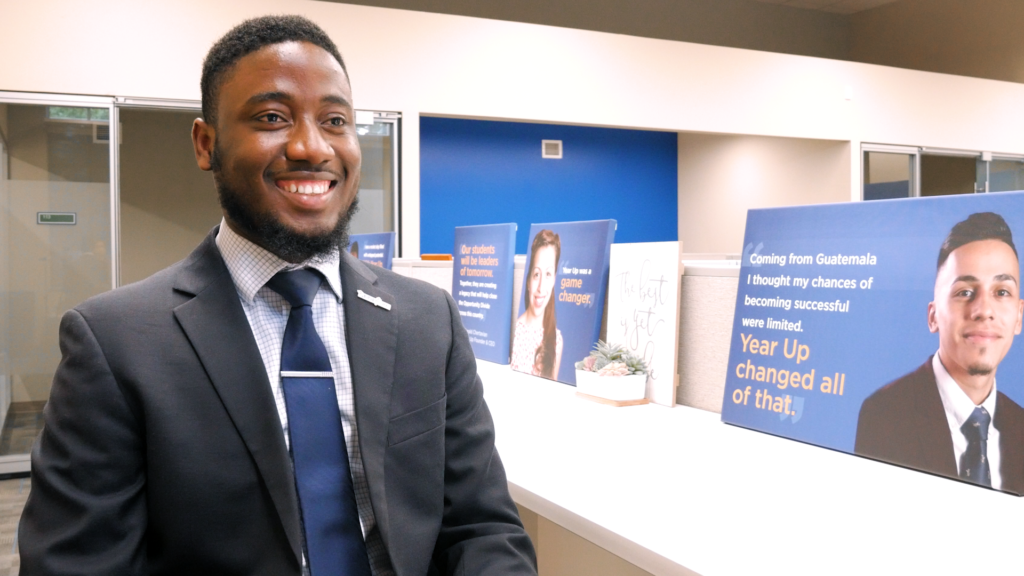

This support doesn’t end when the students graduate the program. “The great thing about Year Up is that, even after they graduate, they still are part of our network,” explained Potts. “We really try to track the young adults up to a year after they graduate, and they stay connected. [If] they decide ‘I want to get a new job in another field,’ or ‘I want to get another job with another company,’ we’re there to support them through that.”
In Wesseh’s case, he found his calling working at the Security Operation Center at Bank of America. “I’ve been able to meet with people within my career who have the experience [and] are able to give me advice to make the right decisions.” He’s thankful for the training offered by the program. “Year Up gave me the head start because I have taken technical courses and classes out of college that helped to improve my knowledge within cybersecurity.”
A growing model
Year Up has been around long enough to know that tracking data is the key for success. “We’ve been in existence for about 20 years. So the data really drives how we deliver the quality of our program,” Potts said.
They look at their students’ progress and outcomes four months, six months, and one year after leaving the program to see how they are doing. One of their benchmarks for success is to have 90% of every graduating class in a meaningful career. That means “in a career that they studied while they were with us,” Potts said. For the other 10%, they want them to be enrolled in school full-time.
See our other Solution Seekers profiles
Year Up Charlotte has seen significant growth in their first year. When they launched, they had two partners: Central Piedmont Community College as their college partner and Bank of America as their corporate partner. Now they have four more corporate partners: Merck, JPMorgan Chase, Honeywell, and AvidXchange.
Potts explained that one of her favorite things about their corporate partnerships is when they come in planning on having their students solely for the duration of the internship and soon realize how prepared these students are. “When they meet our interns, they come up [and say], ‘We’re going to hire your intern because they are fully qualified and ready for this role,’” she said.
Empowering students to own their journey
Another one of Potts’ favorite things about Year Up is to witness her students’ growth in real time. “When I watch a young adult go from day one where they’re not super confident, they don’t know how to tie their tie, they think they don’t know how to behave … Year Up is really just there to walk alongside our young adults to empower them to own their journey.”
She also enjoys seeing her students reap the benefits of their work. “To watch young adults go from working minimum wage jobs to a Fortune 500 company where they never thought they had a seat at the table and make $40,000 in just a year is amazing,” Potts said.
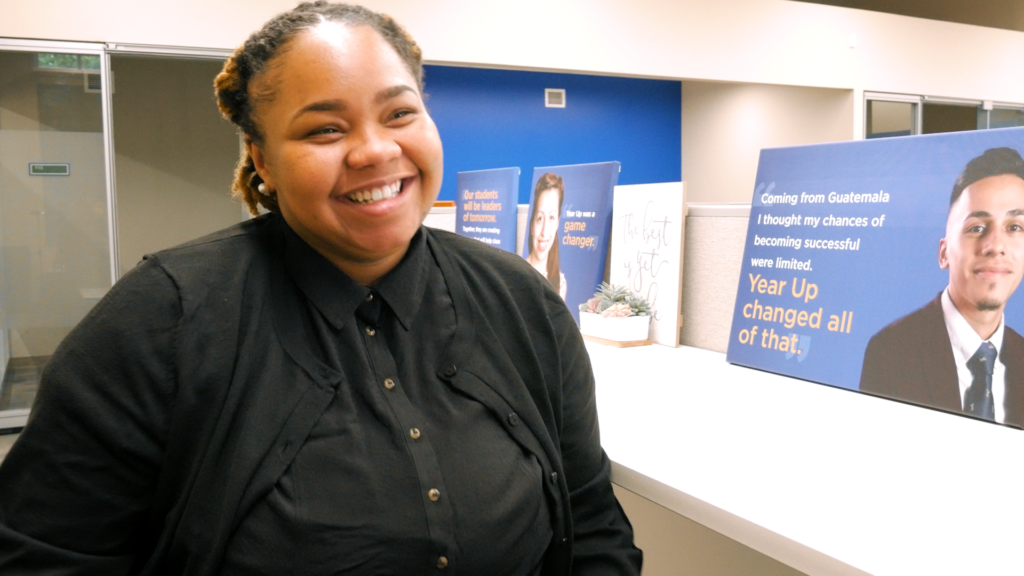

For Ramseur, her internship at Merck shifted her perception of what corporate America is like. “I’ve learned that you can be funny and outgoing and bubbly and upbeat and still maintain a certain level of professionalism to get your job done,” she said. Very early on, Ramseur detected errors in a database they were using at Merck, so she created new database systems that have helped them process information better.
She said Year Up’s partners benefit greatly when a fresh set of eyes comes into their corporation. “We can bring fresh perspectives, we can bring ideas, and we can also help them see ways in which their systems can be improved,” Ramseur said. Potts agreed, saying, “[Our corporate partners] need that young creative mindset that can come in really and change that narrative.”
An extension of their family
Potts explained that Year Up Charlotte takes care of their students holistically. “If we take care of what happens after 8 a.m. to 5 p.m., that student is going to show up prepared and ready to go from 8 a.m. to 5 p.m,” she said. That means offering their students support through whatever they’re experiencing as young adults, whether that means tutoring or venting about life.
They expect their students to make mistakes during the program. In fact, they encourage it. “Make your mistakes in this nurturing environment where we can coach you through [and] have those teachable moment conversations with you so that we can correct it,” Potts said.
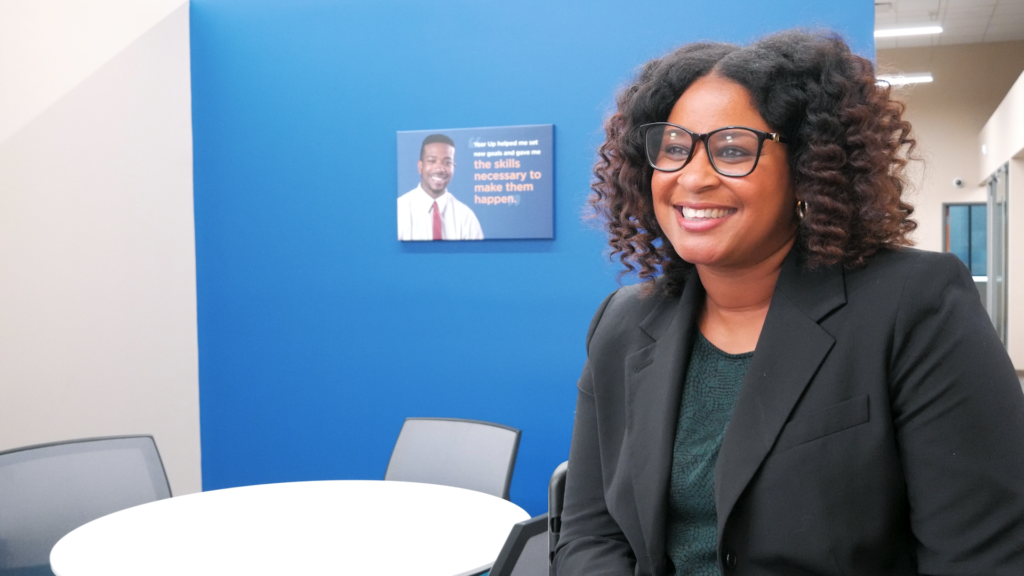

For Potts, the best way to describe Year Up Charlotte is that they’re an extension of their students’ families. “I have tough conversations all the time. And then I love all my young adults afterwards. They know I’m going to give you a tough conversation, but at the end of the day, it’s because I have your best interest at heart.”
For Ramseur, Year Up is an opportunity of a lifetime. “It’s like a large investment with an even larger return. … We gain so much experience [while] getting paid and then we also get to build networks and connections and secure a meaningful career afterwards.”
Setting an example for her family is what motivated Ramseur to apply to Year Up Charlotte. “I have three children,” she said. “So I wanted to be able to provide for them, and I wanted to show them what success looks like.” Growing up, she didn’t have a direct reflection of what success looked like, she said. “So, it just seemed like a no-brainer to join the program that not only would help me gain experience in the corporate world, but would also help me build my professional skills, my life skills, my technical skills, and just overall help me develop as a person.”
